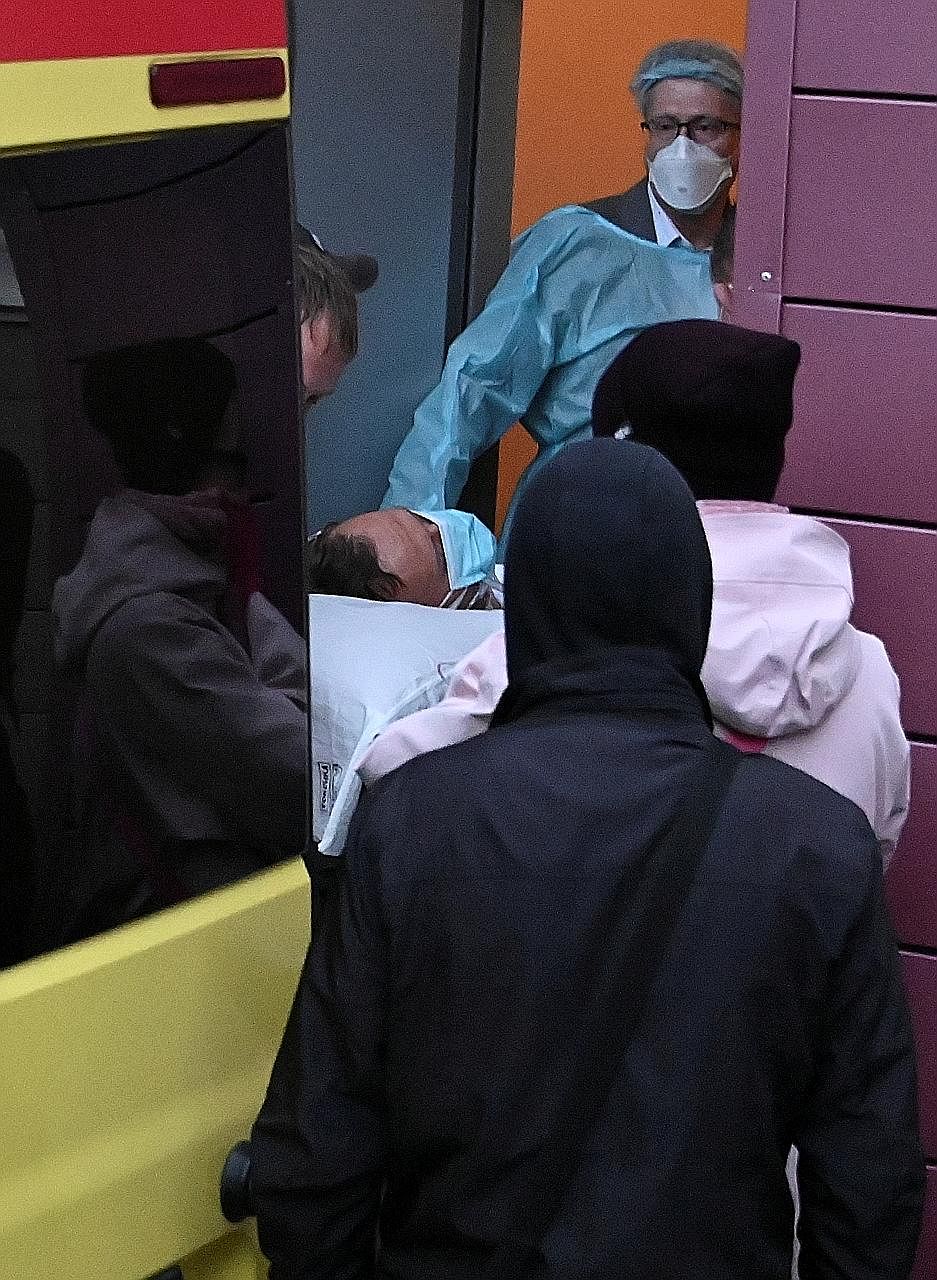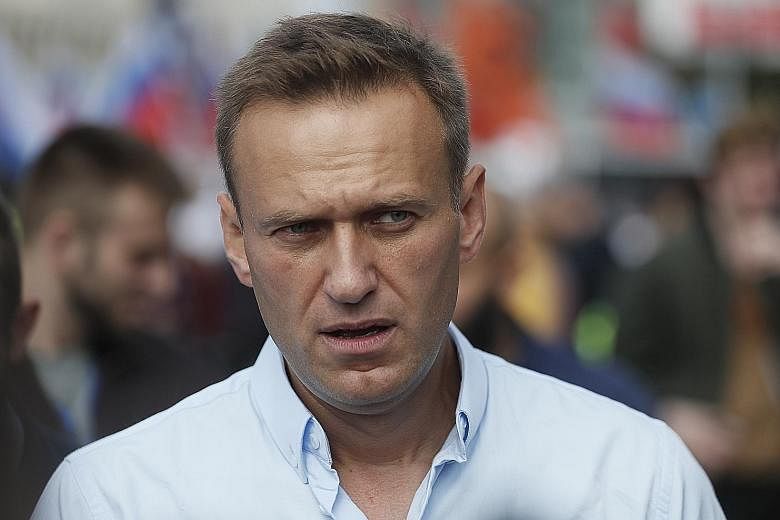BERLIN • Gravely ill Kremlin critic Alexei Navalny was evacuated to Germany for medical treatment yesterday, flown out of the Siberian city of Omsk in an ambulance aircraft and taken to a hospital in Berlin.
There was no word yet from the Charite hospital on his condition, but the founder of the activist group that arranged the flight called Mr Navalny's health condition "very worrying".
A long-time opponent of President Vladimir Putin and campaigner against corruption, Mr Navalny collapsed on a plane last Thursday after drinking tea at an airport cafe that his allies believe was laced with poison.
The air ambulance landed at Berlin's Tegel airport yesterday morning and Mr Navalny, 44, was rushed in a convoy of ambulance and police cars to the city's Charite hospital complex.
The hospital gave no details about his condition, but said in a statement that it would provide an update and further treatment once tests have been completed and after consulting with his family. It said this could take some time.
"His health condition is very worrying," Cinema for Peace founder Jaka Bizilj told reporters outside the hospital.
"We got a very clear message from the doctors that if there had not been an emergency landing in Omsk, he would have died," he said, adding that it would be up to doctors and Mr Navalny's family to provide further information on his condition.
Mr Bizilj, a Slovenian-born activist and film-maker, was earlier quoted by German newspaper Bild as saying that Mr Navalny's condition was stable during the flight and after landing.
Medical staff at the hospital in Omsk had said on Friday evening, before Mr Navalny was flown out, that he was in an induced coma and that his life was not in immediate danger.
German doctors flew to Omsk on Friday to evacuate Mr Navalny at the request of his wife Yulia and allies who said that the hospital treating him was badly equipped. But there was then a delay in flying him out as the hospital initially said he was not in a fit state to travel.
Mr Navalny's spokesman Kira Yarmysh said on Twitter that "this is another proof that nothing was preventing Navalny from being transported, and it was necessary to do so as early as possible".
The day before, Ms Yarmysh had tweeted that the Omsk hospital and authorities' refusal to allow Mr Navalny to be transported to Germany was "an attempt on his life being carried out right now by doctors and the deceitful authorities".

"This decision, of course, was not made by them, but by the Kremlin," she wrote.
Two years ago, Mr Pyotr Verzilov, another anti-Kremlin activist and a member of the Pussy Riot art collective, was also treated at the Charite hospital after he was poisoned in Moscow.
Cinema for Peace had also helped to secure Mr Verzilov's flight to Berlin at that time. And this time, it was Mr Verzilov who had asked Mr Bizilj for help transporting Mr Navalny to Germany, according to the group.
Omsk doctors yesterday said they were ready to share all information they have with the German clinic. Mr Navalny's allies have said that they fear the authorities in Russia might try to cover up clues as to how he fell ill.
Mr Navalny has been a thorn in the Kremlin's side for more than a decade, exposing what he says is high-level graft and mobilising crowds of young protesters.
He has been repeatedly detained for organising public meetings and rallies and sued over his investigations into corruption. He was barred from running in a presidential election in 2018.
Medical staff at the Omsk hospital initially said on Friday that Mr Navalny's condition had improved slightly overnight, but that he was still in too unstable a state to be safely flown out of the country.
They later said they had no objections after the German doctors deemed him fit for travel.
Mr Navalny's wife sent a letter to the Kremlin directly appealing for Mr Putin to intervene and grant permission for Mr Navalny to be allowed to be flown out of the country.
The case has drawn international attention.
United States President Donald Trump said he is looking into the situation, while German Chancellor Angela Merkel called for a probe of the incident and French President Emmanuel Macron said he is extremely concerned.
The Kremlin has not done anything to hinder Mr Navalny's medical evacuation, Mr Putin's spokesman Dmitry Peskov said on Friday, in response to reporters' questions on accusations from Mr Navalny's supporters.
REUTERS, BLOOMBERG
Other Kremlin critics believed to have been targeted

1 Russian opposition activist Pyotr Verzilov (2018)
Without the slightest premonition of any health issues, Mr Pyotr Verzilov suddenly fell violently ill and slipped into a coma in 2018. Mr Verzilov, known for staging anti-government performance art, displayed the same mysterious symptoms that struck Russian opposition politician Alexei Navalny last week. "I was in exactly the same condition," Mr Verzilov on Thursday told independent Russian television station Rain TV of his month-long illness two years ago. Mr Verzilov was kept alive on a ventilator and later flown to Germany for treatment. Though doctors found no trace of poison, he said he is convinced it was the cause and that the Kremlin was responsible for it.

2 Russian spy Sergei Skripal and his adult daughter Yulia (2018)
Mr Sergei Skripal, a Russian spy turned double agent for Britain, was found slumped unconscious on a bench in the British city of Salisbury along with his adult daughter Yulia two years ago. The authorities said the pair were poisoned with the military-grade nerve agent Novichok, and they spent weeks in critical condition. Britain blamed Russia for the poisoning, the first known offensive use of such a nerve agent on European soil since World War II, but Moscow denied involvement. Two Russian men were charged in Britain with the poisoning.

3 Russian opposition activist Vladimir Kara-Murza (2015, 2017)
In 2015, Mr Vladimir Kara-Murza fell into a week-long coma in Moscow. He later said he believed he had ingested poison during the inflight service on an Aeroflot plane. His symptoms included swelling in his brain and kidney failure. His wife Yevgenia recalled that his arms and legs took on a bluish hue - an alarming reaction to poison. Mr Kara-Murza said he was poisoned and survived a second attempt in 2017 while travelling in Russia to show a documentary about another Russian politician, Mr Boris Nemtsov, who was shot and killed on a bridge in Moscow in 2015.

4 Russian opposition journalist Anna Politkovskaya (2004)
Investigative journalist Anna Politkovskaya was also poisoned after drinking a cup of tea on a domestic flight operated by another Russian airline, Karat, in 2004. She survived but was shot and killed in her apartment elevator two years later. Five men were sentenced for carrying out the killing but no one was convicted for ordering it.

5 Ukraine's former president Viktor A. Yushchenko (2004)
Ukraine's pro-Western former president Viktor A. Yushchenko was left with his face disfigured after being poisoned with the industrial pollutant dioxin - most likely concealed in a meal of boiled crayfish. He attributed the poisoning to Russian agents.

6 Russian defector Alexander Litvinenko (2006)
Former KGB agent Alexander Litvinenko, who had fled to Britain after defecting from Russia, died in 2006 after drinking tea laced with polonium-210 at a London hotel. Russian President Vladimir Putin probably approved the killing, a British inquiry concluded in 2016. The inquiry found that a former KGB bodyguard and another Russian had carried out the killing, probably directed by Russia's Federal Security Service, the main heir to the Soviet-era KGB. Moscow denied involvement.
NYTIMES, REUTERS

